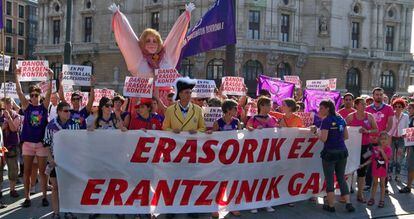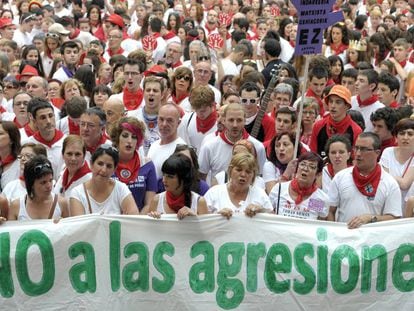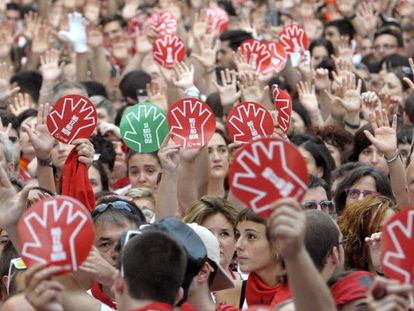Security ramped up at Spain’s summer fiestas in bid to protect women
Rape cases at Sanfermines prompt authorities to take zero-tolerance approach to sexual assaults

Extensive media coverage of the rapes and sexual assaults committed at this July’s Sanfermines fiestas in Pamplona have prompted Spain’s regional and local authorities to announce they will be increasing security at similar events held throughout the country during the summer months in a bid to protect women.
There have been a series of protest marches in cities holding fiestas over the last month in response to the sexual assaults in Pamplona during the world-famous Sanfermines bull-running events, which included a gang rape. Many local authorities have announced measures that include awareness campaigns, self-defense courses for women, as well as drafting in extra police officers.
Vitoria, San Sebastián and Bilbao also announced measures to curb sexual harassment during their annual fiestas earlier this month
The town council of Buñol, in Valencia, where the annual Tomatina tomato-throwing fiesta will be held next week, attracting some 22,000 people, says that around 600 police officers and civil guards will be helping local police. Among them will be undercover officers. The town of some 10,000 people sees its population swell on August 31, with around 60% of revelers coming from abroad.
The experts agree that huge events such as the Tomatina or Sanfermines, with thousands of people packed into small towns where they drink and take drugs, increase the likelihood of sexual assaults against women. “It’s really a question of statistics,” says forensic psychologist Timamfaya Hernández: “The context makes it more likely, and there is also the idea that anything goes at these kinds of mass events,” she says, adding that alcohol and narcotics play a large part: “They make people much less inhibited.”
She says that women are also more likely to lower their guard: “Not that women are responsible for being attacked, but they are simply more vulnerable and there are more men out there likely to assault them.”
At the same time as introducing measures to protect women during fiestas, the experts say that more needs to be done to instill the values of equality in children at school. That said, Pilar Martín Nájera, a public prosecutor who focuses on gender-specific violence cases, believes that society increasingly rejects men who are violent toward women. “We see greater social rejection,” she says. “It is clear that there is greater awareness,” adds Javier Elzo, a sociologist at the University of Deusto.
Buñol’s local council has said it will be taking a zero-tolerance approach during the Tomatina, and has prepared special measures against “gender violence, male abuse and any type of violence against other vulnerable groups. We cannot allow local fiestas to be used to breach other people’s rights,” it says in a statement, warning that anybody found to be involved in any kind of sexual harassment will be detained and brought before the courts.
The three main cities of the Basque Country, Vitoria, San Sebastián and Bilbao, have also announced measures to curb sexual harassment during their annual fiestas this month.
At the same time as introducing measures to protect women during fiestas, the experts say that more needs to be done to instill the values of equality in children at school
In Vitoria, the city council has organized awareness courses for shops, bars, and residents. During its fiestas, held during the first week of August, stands and information points were set up for women, while emergency numbers were made available in bars and throughout the city. Despite the measures, a young woman was attacked in an underpass.
In San Sebastián and Bilbao, residents and shop owners joined a campaign under the slogan: “Insisting is harassment, and harassment is an attack.”
In Bilbao, trams and buses carried banners with the slogan, while some 14,000 cards with the number of the local police and emergency services were handed out. A further 700,000 paper napkins with the same information were also distributed in bars and restaurants.
In Mallorca’s main city of Palma, the authorities launched a campaign under the slogan “Palma, free of sexual assaults during its fiestas”, which, aside from aiming to raise awareness, also includes self-defense workshops. Posters have been plastered throughout the city.
Meanwhile, in Andalusia, for the upcoming Cascamorras fiestas in the small town of Baza, in Granada province, which attracts some 15,000 people, the authorities have launched an awareness campaign under the slogan “No means no. Enjoy the night and respect others.”
“We have assessed how many people will be here, and with so much alcohol there is always a risk,” says Baza’s equality councilor Mariana Palma. “The attacks in San Sebastián have increased awareness,” she adds. That said, at the recent Feria de Malaga, held in a huge events area outside the city, there were no extra measures in evidence to protect women.
With information from: Pedro Gorospe, Javier Martín-Arroyo, Lucía Bohórquez and María Josep Serra.
English version by Nick Lyne.












































